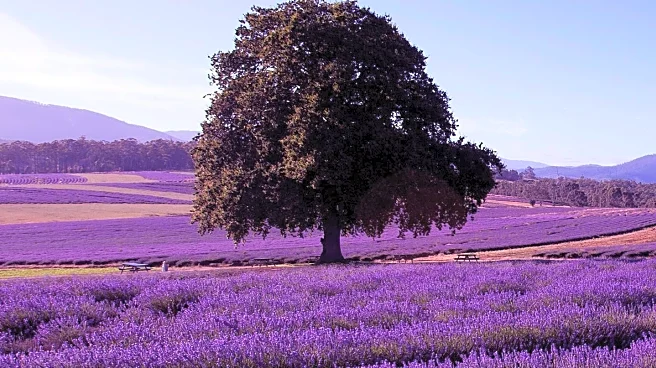What's Happening?
In the Lake District, traditional farming practices are evolving as local farms diversify their agricultural activities. The Lyth Valley, known for its damson orchards, is witnessing a shift towards lavender farming. Sandi Friend, a member of the Ladies With Livestock group, is spearheading this change on her former dairy farm. Purchased in 2020, the farm aims to restore soil and grasslands, rejuvenate hedgerows, and revive damson orchards. The introduction of commercial lavender growing, branded as Lake District Lavender, marks a new venture. The initiative involves community participation in harvesting lavender using hand scythes, amidst a picturesque valley setting. Despite challenges such as the closure of the farming capital grant scheme, which affected plans for group visits, the project continues to thrive.
Why It's Important?
The shift towards lavender farming in the Lake District represents a broader trend of diversification in agriculture, crucial for sustainability and economic resilience. By embracing new crops like lavender, farms can mitigate risks associated with traditional farming, such as market fluctuations and environmental changes. This diversification not only supports local economies but also enhances biodiversity, attracting pollinators like bees and butterflies. The initiative reflects a growing interest in sustainable practices and community engagement, offering potential for agritourism and educational opportunities. As traditional farming faces challenges, such innovative approaches could redefine rural economies and contribute to environmental conservation.
What's Next?
The future of lavender farming in the Lake District may involve expanding agritourism and educational programs, contingent on securing funding and support. As the community adapts to new agricultural practices, collaboration with local businesses and government agencies could enhance the project's viability. Potential developments include exploring additional markets for lavender products and integrating sustainable farming techniques. Stakeholders may advocate for reopening grant schemes to support such initiatives, emphasizing the importance of diversification in rural economies. Continued community involvement and adaptation to market demands will be key to the project's success.
Beyond the Headlines
The introduction of lavender farming in the Lake District highlights the cultural and environmental shifts in rural communities. It underscores the importance of preserving traditional landscapes while adapting to modern agricultural demands. The project may inspire similar initiatives in other regions, promoting sustainable practices and community-driven agriculture. Ethical considerations include balancing economic growth with environmental stewardship, ensuring that new farming practices do not compromise local ecosystems. The initiative could foster a renewed appreciation for rural heritage and encourage innovative solutions to contemporary agricultural challenges.









